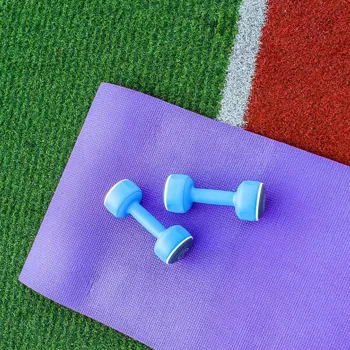Unlock Career Success with Lifestyle Enhancements: 7 Practical Tips to Boost Your Potential and Achieve Goals. Delve in!
In today's competitive world, simply possessing the required skills and qualifications
isn't always enough to climb the corporate ladder. Personal and professional growth go hand in hand, and often, subtle lifestyle adjustments can make a significant impact on your career trajectory.
Think of it this way: your overall well-being fuels your productivity and creativity at work. This article will explore seven practical lifestyle enhancements that can empower you to unlock your full potential and achieve your career goals.
These tips are simple, effective, and easy to integrate into your daily routine. So, gear up to revamp your lifestyle and supercharge your career growth! After all, a better you translates to a better professional.
Let's delve in and explore these transformative strategies.
Prioritize Sleep: Recharge Your Mind and Body
In the hustle and bustle of daily life, sleep often becomes the first casualty. We tend to compromise on sleep to meet deadlines, attend social gatherings, or simply scroll through social media.

However, sacrificing sleep can have detrimental effects on your cognitive functions, mood, and overall well-being. Adequate sleep is crucial for optimal brain function, enhancing memory consolidation, and improving focus.
When you're well-rested, you can think more clearly, make better decisions, and handle stress more effectively – all essential for career success.
Aim for a consistent sleep schedule, going to bed and waking up at the same time each day, even on weekends.
Create a relaxing bedtime routine, such as taking a warm bath, reading a book, or listening to calming music. Ensure that your bedroom is dark, quiet, and cool to promote restful sleep.
Avoid screen time (phones, tablets, and computers) before bed, as the blue light emitted from these devices can interfere with your sleep cycle. If you struggle with sleep, consider consulting a doctor or sleep specialist to identify and address any underlying issues.
Remember, sleep is not a luxury; it's a necessity for both your physical and mental health, directly impacting your work performance. Invest in your sleep, and you'll see a significant improvement in your productivity, creativity, and overall career satisfaction.
A well-rested mind is a sharp mind, ready to tackle challenges and seize opportunities. Make sleep a priority, and watch your career flourish.
Prioritizing sleep also enhances your emotional intelligence.
Embrace Mindfulness: Cultivate Inner Peace and Focus
In today's fast-paced and hyper-connected world, it's easy to get caught up in the whirlwind of thoughts and emotions. Practicing mindfulness can help you cultivate inner peace, reduce stress, and improve focus, all of which are essential for career success.
Mindfulness involves paying attention to the present moment without judgment, observing your thoughts, feelings, and sensations as they arise and pass away.
It's about being fully present in whatever you're doing, whether it's attending a meeting, working on a project, or simply enjoying a cup of tea.
There are various ways to incorporate mindfulness into your daily routine.
You can start with simple breathing exercises, focusing on your breath as it enters and leaves your body. You can also try meditation, setting aside a few minutes each day to sit quietly and observe your thoughts without getting carried away by them.
Another effective technique is mindful walking, paying attention to the sensations of your feet touching the ground, the movement of your body, and the sights and sounds around you.
Mindfulness can help you manage stress by allowing you to observe your emotions without reacting impulsively.
It can also improve focus by training your mind to stay present and resist distractions. By cultivating inner peace and focus, you can enhance your productivity, creativity, and decision-making skills, ultimately boosting your career prospects.
Starting your day with 5-10 minutes of meditation can set a calm and focused tone for the rest of the day. Regularly practicing mindfulness leads to greater self-awareness.
Nurture Your Body with Good Nutrition: Fuel Your Success
What you eat directly impacts your energy levels, cognitive function, and overall health, all of which play a crucial role in your career success. Processed food with high sugar and unhealthy fats can lead to energy crashes and decreased focus.
On the other hand, a balanced diet rich in fruits, vegetables, whole grains, and healthy proteins provides sustained energy, sharpens your mind, and boosts your immune system.
Focus on incorporating a variety of nutrient-rich foods into your daily meals.
Start your day with a healthy breakfast, such as oatmeal with fruits and nuts or a whole-wheat toast with avocado. Pack healthy snacks, like fruits, vegetables, or yogurt, to avoid unhealthy cravings during the day.
Drink plenty of water throughout the day to stay hydrated and maintain optimal brain function. Limit your intake of processed foods, sugary drinks, and excessive caffeine. Experiment with new recipes and cooking techniques to make healthy eating enjoyable and sustainable.
Meal prepping on weekends can save time and ensure you have healthy options readily available during the week. Prioritizing your nutrition is not just about maintaining a healthy weight; it's about fueling your body and mind for peak performance.
A healthy diet enables you to perform the best at work.
Good nutrition also reduces stress and fatigue, helping you manage work better.
Stay Active: Boost Your Energy and Mood
Regular physical activity is not just about staying physically fit; it's also about boosting your energy levels, improving your mood, and reducing stress – all essential for career success.

Exercise has been shown to increase blood flow to the brain, enhancing cognitive function and improving memory. It also releases endorphins, which have mood-boosting effects and can help you cope with stress.
Find an activity that you enjoy and can incorporate into your daily or weekly routine.
This could be anything from brisk walking, jogging, swimming, cycling, dancing, or yoga. Aim for at least 30 minutes of moderate-intensity exercise most days of the week.
Even short bursts of activity, like taking the stairs instead of the elevator or walking during your lunch break, can make a difference.
If you have a sedentary job, make it a point to take regular breaks to stretch and move around.
Consider investing in a standing desk or taking walking meetings to break up long periods of sitting. Exercising with a friend or colleague can help you stay motivated and make it more enjoyable.
Remember, physical activity is not just about physical benefits; it's also about mental and emotional well-being. Staying active can help in balancing work and life.
Staying active boosts creativity and problem-solving skills.
Cultivate Strong Relationships: Build a Support System
Human beings are social creatures, and strong relationships are essential for our well-being and career success. Nurturing your relationships with family, friends, and colleagues can provide you with emotional support, valuable connections, and opportunities for growth.
Make an effort to stay connected with loved ones, whether it's through regular phone calls, video chats, or in-person visits. Spend quality time with your family and friends, engaging in activities that you enjoy together.
Build strong relationships with your colleagues by being supportive, collaborative, and respectful. Network with people in your industry or field to expand your professional connections and learn from others' experiences.
A strong support system can provide you with a sense of belonging, reduce stress, and boost your confidence. It can also offer you valuable advice, mentorship, and opportunities for career advancement. Remember, building strong relationships takes time and effort, but the rewards are well worth it.
A good network can help you advance in your career.
Strong relationships provides good understanding and communication skills.
Continuous Learning: Stay Ahead of the Curve
In today's rapidly evolving world, continuous learning is essential for staying ahead of the curve and achieving career success. Technology is constantly changing, and new skills and knowledge are always in demand.
Embracing a growth mindset and committing to lifelong learning can help you adapt to change, enhance your skills, and expand your career opportunities.
There are various ways to engage in continuous learning.
You can take online courses, attend workshops or seminars, read books and articles, listen to podcasts, or participate in industry conferences. Identify areas where you want to improve your skills and knowledge, and then seek out resources and opportunities to learn.
Don't be afraid to step outside of your comfort zone and try new things. Embrace challenges as opportunities for growth and learning. Seek feedback from others and use it to improve your performance.
Continuously learning and growing will not only make you a more valuable employee but also increase your job satisfaction and career prospects. Continuous learning expands your adaptability so you can adjust to changes.
Continuous learning boosts confidence and self-esteem.
Time Management and Organization: Master Your Day
Effective time management and organization are crucial for maximizing your productivity, reducing stress, and achieving your career goals. Poor time management can lead to missed deadlines, decreased efficiency, and increased stress levels.

Mastering your time and organization skills can help you prioritize tasks, stay focused, and achieve more in less time.
Start by creating a daily or weekly to-do list, prioritizing tasks based on their importance and urgency. Break down large tasks into smaller, more manageable steps.
Use a calendar or planner to schedule appointments, meetings, and deadlines. Avoid procrastination by tackling the most challenging tasks first.
Eliminate distractions, such as social media and email notifications, while you're working.
Delegate tasks when possible to free up your time for more important responsibilities. Take regular breaks to avoid burnout and stay focused. Experiment with different time management techniques to find what works best for you.
Remember, time is a precious resource, and effectively managing it can make a significant difference in your career success. Good time management will lead to more efficiency.
Good time management improves work-life balance.












